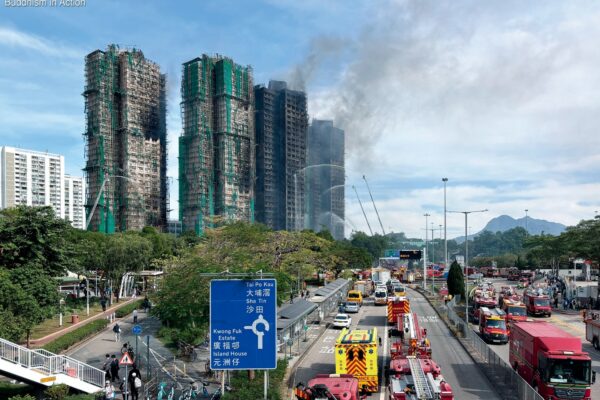By Luo Yonghua
Translated by Wu Hsiao-ting
He had lived with a debilitating illness for 18 years when Tzu Chi helped him obtain treatment. After all those years of suffering, he finally could see light shining into his life.
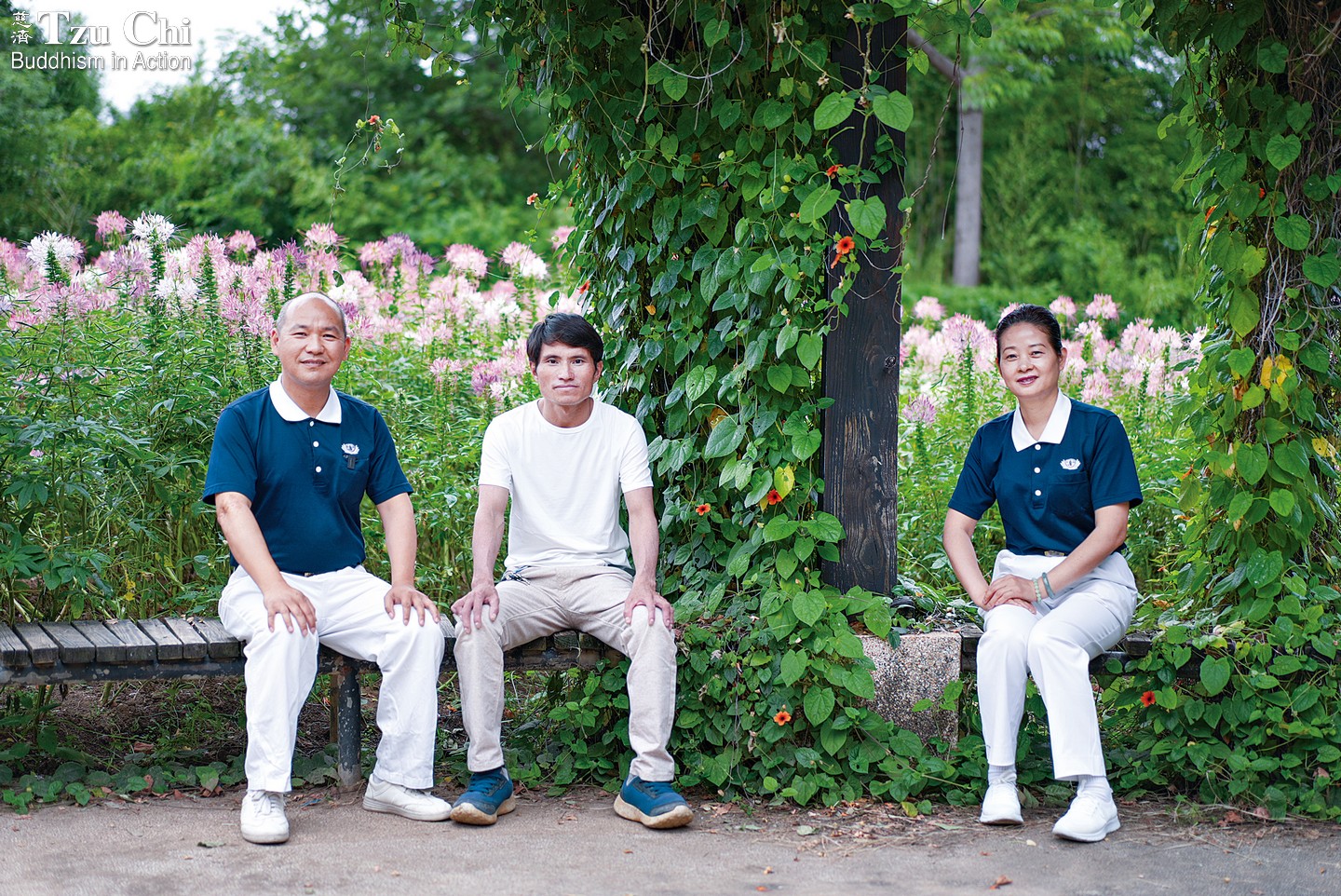
Luo Yonghua (羅永華), middle, the author of this article, traveled to Xiamen again in May 2022 to receive follow-up treatment for his psoriasis. He can happily wear short sleeves now, showing to the public the arms he used to hide to conceal his skin condition.
Wu Dehua
Xiamen, in southeastern China, is a dream city for many people, myself included. I once hoped that I could make it in that big, bustling city in Fujian Province and return to my rural hometown in style and glory. Sadly, life is full of curveballs and often doesn’t turn out the way we plan or hope. In my case, an illness threw my life off track and made it difficult for me to continue working in Xiamen. I used up my paltry wages paying for my medical bills, but my illness, instead of taking a turn for the better, just grew worse. It was then that I knew my time trying to carve a path for myself in the city had come to an end.
Boarding the bus back to my hometown, I felt as if I were duckweed, drifting with the current, unable to control my own fate. Instead of being adorned with the trappings of success, I was returning home with nothing to show for myself, back to that poor, far-flung village in the mountains in Liancheng County, Fujian Province, back to live with parents who had toiled and moiled their entire lives but still lived in poverty.
My condition continued to worsen after I had returned home. Even walking became difficult. Lying in my bed, I watched one season give way to another. More than that, I watched as life passed me by. When I occasionally browsed through old photos, the hopeful, younger versions of me felt so far away—as far away and unreachable as the promising city of Xiamen.
The first time Tzu Chi volunteers came to my home, I thought they were government workers visiting impoverished households. Some of them were wearing yellow vests, others were dressed in neat, tidy uniforms of blue shirts and white trousers (for certified volunteers). I learned later through our conversation that they were from Xiamen.
I felt very awkward when they arrived, with my terrifying-looking skin in plain view. Then one of the volunteers, a female, went to sit next to my father at a table. Her expression was soft and gentle. Her manner of speaking seemed to possess a magical power, capable of dissolving any unease in the air. I learned later this was Sister Lin Xiufang (林秀芳).
She asked Dad for some details about our family and the typical yield of our farm. Then, rising from her seat next to my father’s, she came to sit by me. She lightly touched my hand, covered in reddish, scaly plaques, taking me aback. But in the same comforting manner with which she had talked with my father, she inquired about my condition and what treatments I had tried for it.
When the cars in which they had arrived took them away again, my life fell back into its usual, simple routine. My brother was out of town working, my parents were usually busy tending to our crops in the field, and my sister-in-law, being mentally disabled, wasn’t much of a help around the house. Thus, it fell to me to care for my young niece and nephew. When they cried, I held them in my arms to soothe them; when they wet their pants, I stripped off their trousers and changed them for dry ones. When they finally had a quiet moment, I’d wearily head back to my bed and lay down for a while to give my heavy, aching legs a rest.
A month after the volunteers’ visit, I heard from my brother that some people would be visiting us in our home in a couple of days. This time, I prepared before they arrived, putting on long-sleeved clothes so that less of my skin would be exposed. When the day came, a few cars pulled into our village. When they disembarked, I noticed that they were wearing the same outfits as the volunteers before: yellow vests, or blue and white uniforms. The ones in blue and white, I had come to learn, were from Xiamen, while those in yellow vests were from closer to home: Liancheng County. I was surprised they were visiting again.
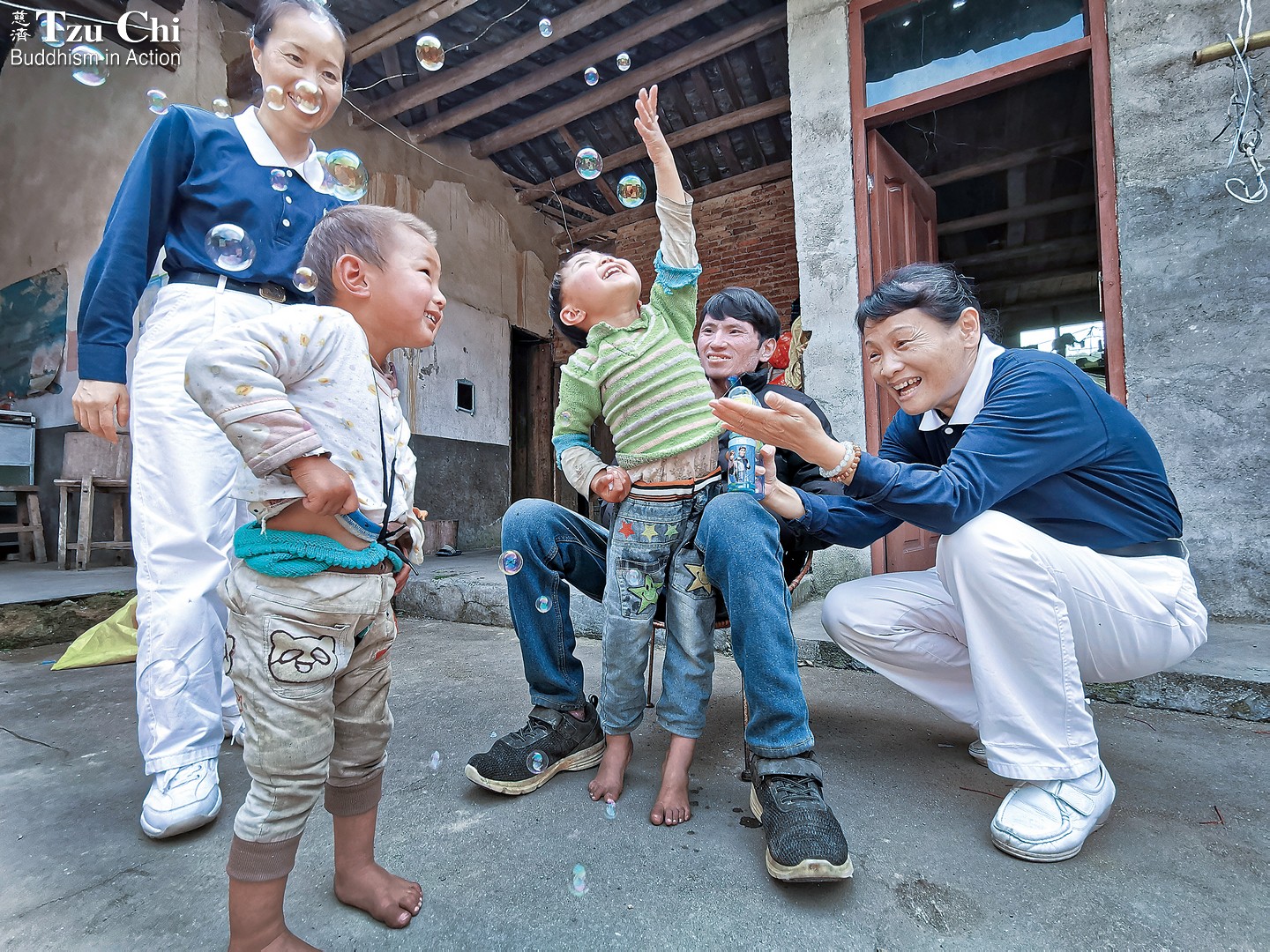
Volunteers from Xiamen have a good time with Luo and his niece and nephew at Luo’s home in the countryside of Liancheng County.
Huang Dexin
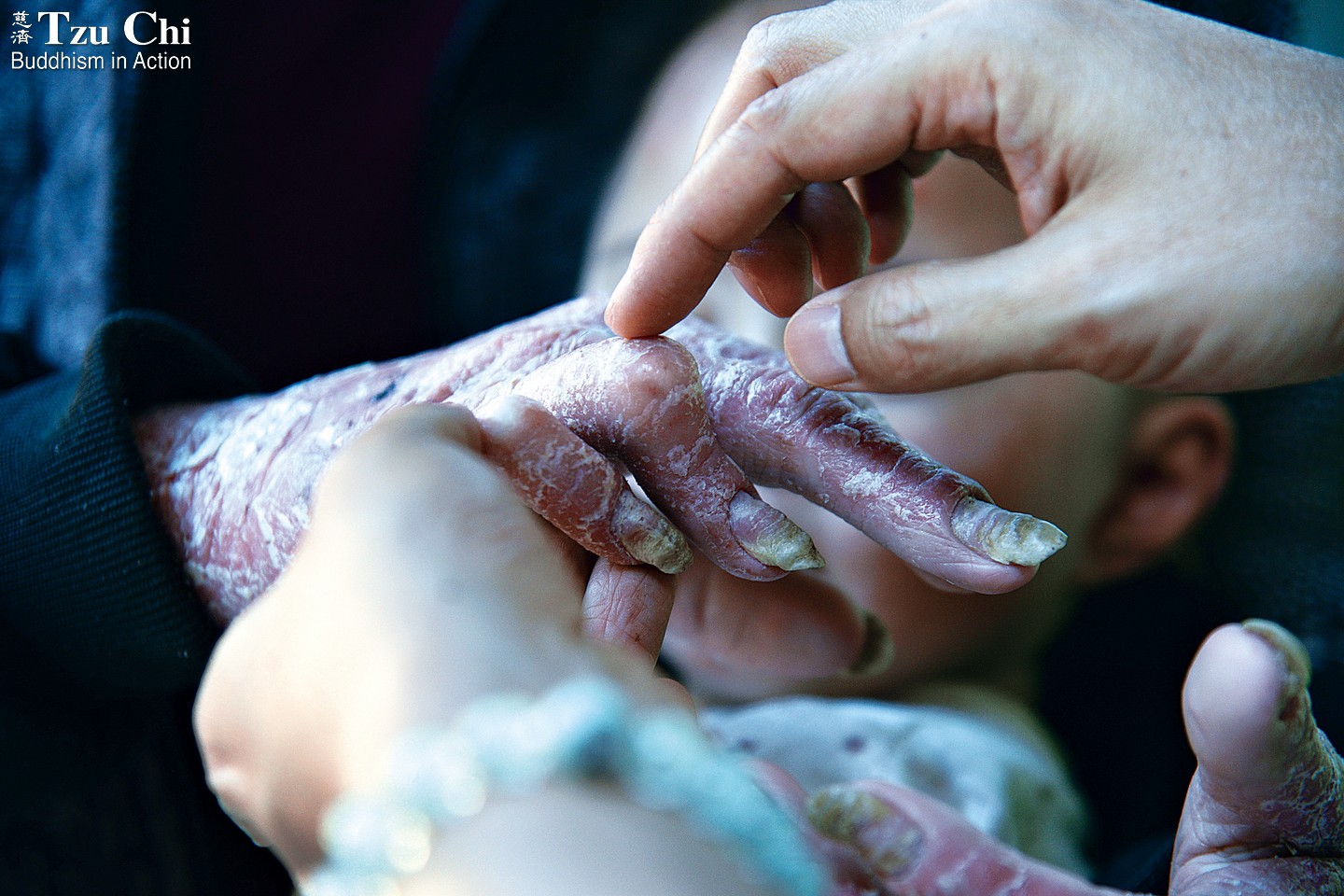
An autoimmune condition resulted in Luo’s discolored, scaly skin and deformed joints. This photo shows a Tzu Chi volunteer checking his hand during their first visit to his home in August 2019.
Wang Yanling
A closed heart opens
Sister Chen Yanzhen (陳豔珍) was among the volunteers who visited this time. Bespectacled and smiling, she walked towards me, addressed me by name, then held my wrist for a moment. As before, I was taken aback by her physical touch. Just as I was wondering how she came to know me, she said she had seen me in the video taken when Sister Xiufang and the other volunteers visited us last time.
Having been ill for so many years, I had become inured to people’s apathy and indifference, and had long shunned physical contact with others. But these Tzu Chi volunteers touched me so naturally, without any fear or hesitation. Their quiet compassion carried the weight of a thunderclap, cracking open my closed heart.
Xiamen Tzu Chi volunteers visited us every month after that, and continued to visit me after I had moved alone into government housing. Knowing that washing clothes by hand was an inconvenience with my condition, they even bought me a washing machine.
How I wished my skin would return to normal so I could face these volunteers with a healthy look. However, there was no known cure for psoriasis, the disease afflicting me. I was destined to live with it throughout my life unless there was a medical breakthrough. That being the case, I thought it’d be better for the volunteers not to waste Tzu Chi’s precious resources on me, but to use them instead on worthier purposes—such as helping poor children who couldn’t afford schooling. With these thoughts in mind, I asked the volunteers to stop visiting. I coldly told them their visits were bothering me. To further deter them, I even told them I was moving to a place where none of them could find me.
In response, Sister Qiu Lianna (邱蓮娜) sent me a message saying that she was sorry their visits were troubling me. She said that they’d stop visiting me for a month but expressed hope that I would allow them to visit my family instead that month.
Her words made me realize that they wouldn’t be easily deterred—now that they had started helping me, they would never easily give up on me.
In fact, it was not easy for them to travel again and again all the way from Xiamen to visit needy people like me. I could feel how precious their love was—a love more special than that from family, because it was not bonded by blood.
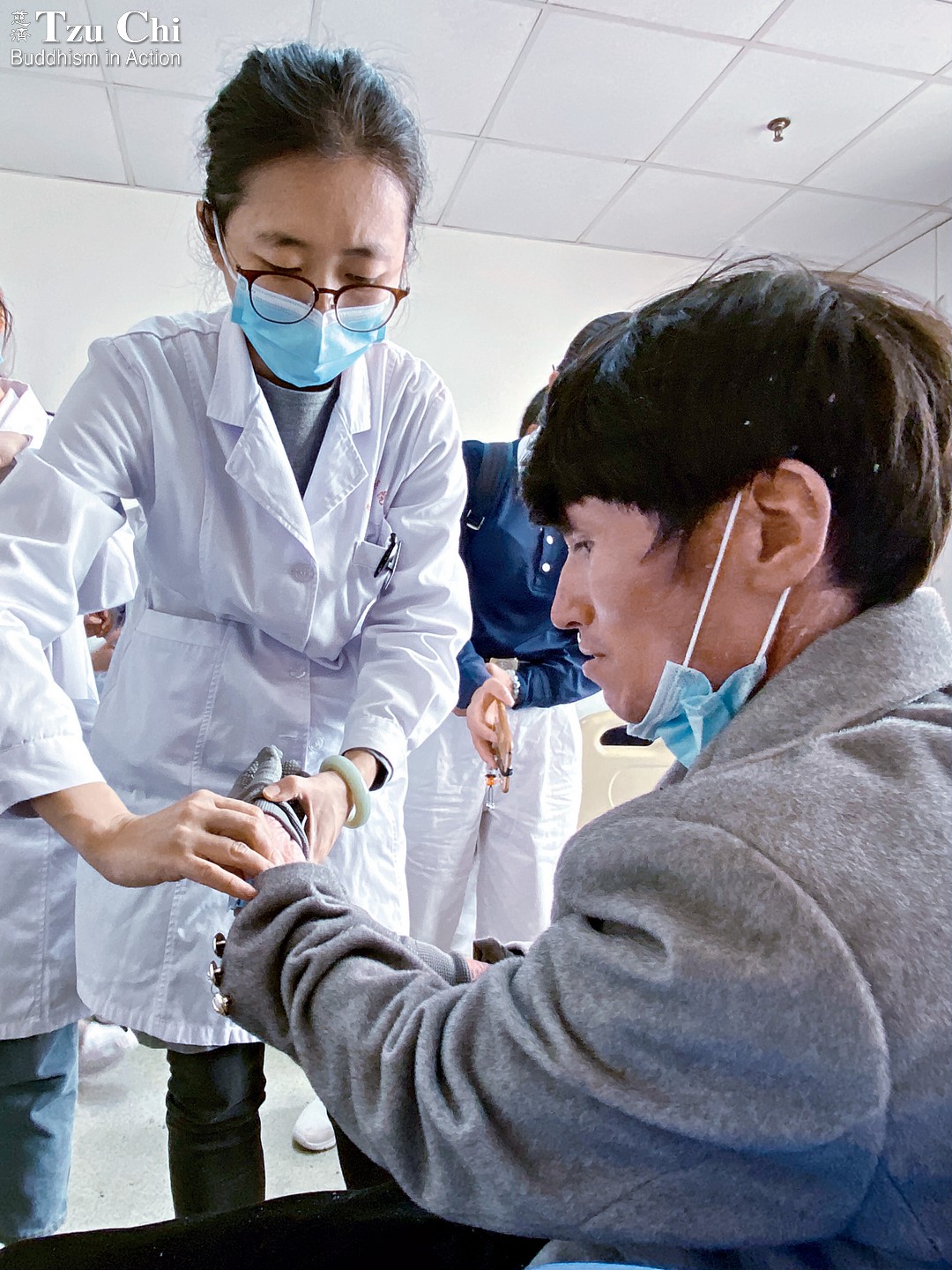
Dr. Li Yihan diagnoses Luo at the Xiamen Hospital of Traditional Chinese Medicine in November 2021.
Jiang Caiye
Nothing short of a miracle
In a blink of an eye, Tzu Chi volunteers had been visiting me for two years. They did more than visit, actually—they had also been finding ways to help me regain my health and live a normal life. That’s easier said than done though, especially for a stubborn disease like psoriasis, a disease I had lived with for 18 years.
But easy or not, they kept at it, continuing to seek a miracle. Then, finally, Sister Lianna learned at her workplace, the Xiamen Hospital of Traditional Chinese Medicine, about a biological therapy that might help me effectively manage my illness. I should have been happy when I heard the good news, but years of repeated failures at finding relief for my condition had caused me to lose faith in any so-called “miracle” cures. I didn’t think anything would work, so when the volunteers talked to me about seeking treatment at the hospital, I turned them down.
But, like my attempts to turn them away before, they didn’t give up so easily. They kept working to get me to agree. Sister Lianna even told me that they had applied to Tzu Chi for funding for my treatment, and that it would be a great pity if I didn’t even give it a try. Seeing how hard they were trying to help me, I eventually gave in and agreed to give the therapy a go.
On November 18, 2021, my brother accompanied me to Xiamen to start my treatment. Early that morning, Brother Luo Shoulin (羅壽林) picked us up at my place and drove us to the train station. When the train bound for Xiamen started moving, I was overwhelmed with emotion, my youthful dream of making it in that big city fresh and vivid in my mind.
We arrived in Xiamen at 9:30 that morning, after a ride of less than two hours. As I entered the Xiamen Hospital of Traditional Chinese Medicine, I looked around at the other people seeking medical attention there. Sad memories of seeking treatment for my illness to no avail surfaced unbidden in my mind. Sister Lianna took care of my check-in procedure, then took us to the 13th floor. Yin Chunlian (殷春蓮), another Tzu Chi volunteer working at the hospital, dropped by to check on me as soon I was settled in my room. She said she wouldn’t leave me alone at the hospital and would visit me whenever she had a free moment.
While I was still talking with Sister Chunlian, Dr. Li Yihan (李依寒), my attending physician, arrived. She asked about my medical history while carefully examining my red and scaly hands. I was very surprised to see that neither she nor the nurse wore gloves during their time with me. This was quite a contrast to my previous visits to the doctor. During those visits, medical workers would don several layers of gloves before daring to touch my skin—they had acted as if I was suffering from some highly contagious disease. But Dr. Li was different, and I immediately admired her expertise. She knew that my condition was an immune system problem, and though my skin looked horrifying, it was anything but infectious.
The next day, Dr. Qiu Mingshan (邱明山), from the department of rheumatology and immunology, led a team of physicians to my room when they were making rounds in the ward. Sister Lianna had once arranged during a visit to my home for Dr. Qiu to meet with me online. Half a year had passed since then, and I was surprised that Dr. Qiu still remembered me. Their plan for me was to give me a thorough physical checkup before starting the biological therapy. While waiting for the results to come out, they would do some routine auxiliary treatment, combining traditional Chinese medicine and Western medicine.
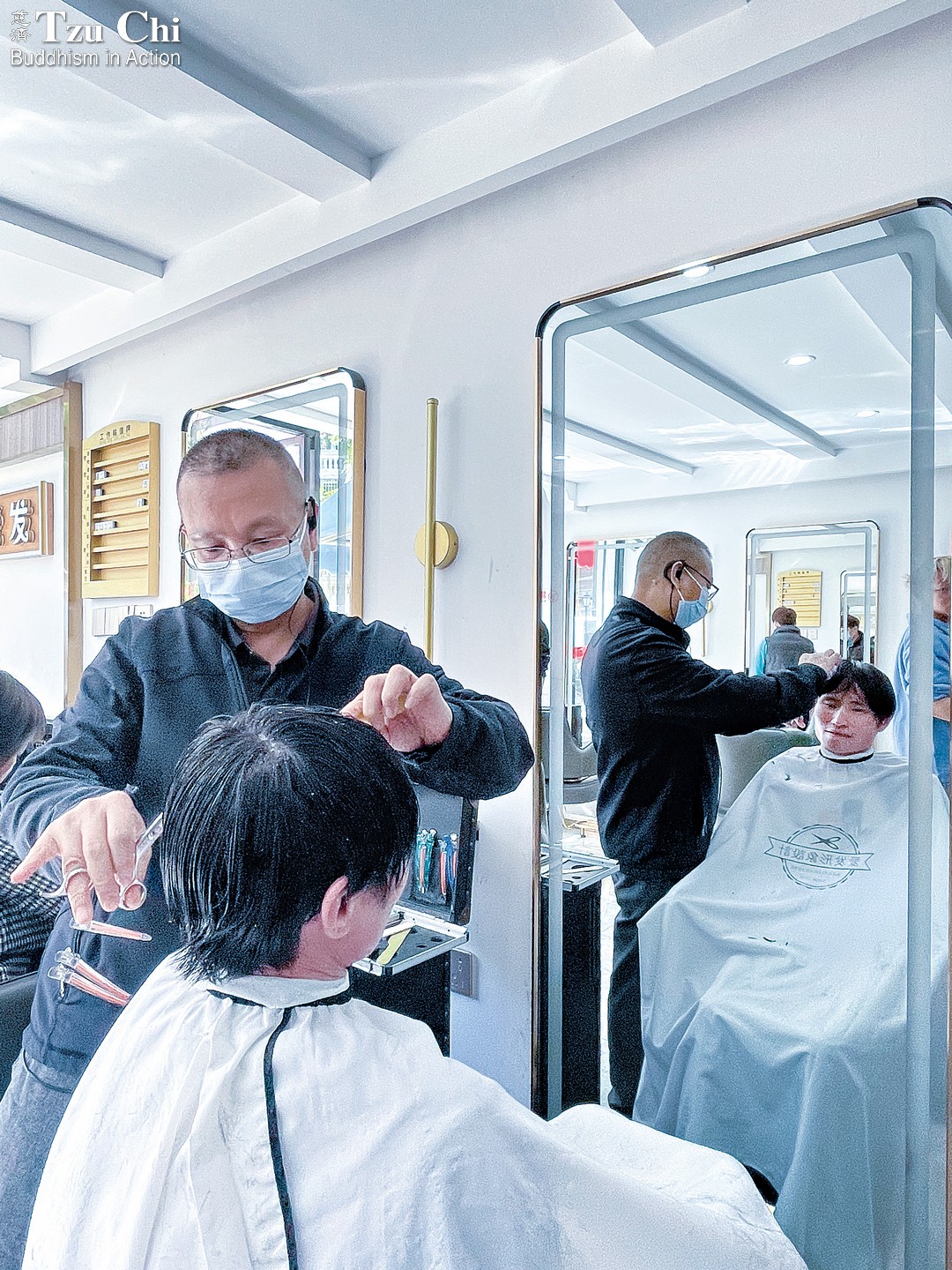
Lin Jinxiong, a Tzu Chi volunteer and hairdresser, gives Luo a haircut when the latter finished his first treatment session in early December 2021. The volunteer encouraged Luo by saying: “Have faith in others, have faith in yourself, have faith that you’ll get better and better.”
Jiang Caiye
Feeling reborn
My first week at the hospital was spent almost entirely on all kinds of tests. The care the hospital gave to patients was comprehensive. Because I had no family with me and because I couldn’t get around easily by myself, there were people to push me around in a wheelchair during the testing. Even so, Tzu Chi volunteers still made time to visit me and keep me company.
Years of suffering from the illness had made my legs as heavy and painful as if they were shackled to some tremendously heavy stones. Every step I took was laborious. However, after I started my treatment, I began to notice an increase in my urine output. Following that was a feeling that a huge load had been taken off my legs. The newly gained lightness of my legs greatly increased my desire to move around. Every day, I’d go down to take a walk around the hospital. My joints had deformed due to my chronic illness, restraining my movement, but it was nothing compared to the extreme difficulty walking I had experienced before I began my treatment. My skin condition also started to greatly improve.
I finished my first treatment session at the end of my two-week hospitalization, and was already feeling great. After a hiatus of one week, I would return to the hospital to begin my second treatment session. After I was discharged from the hospital, I rode in a car driven by Sister Jiang Caiye (江采曄). I looked out the window at everything in the outside world with a fresh eye. I felt reborn. Brother Huang Dexin (黃德欣) had arranged for me to have my hair cut by another Tzu Chi volunteer, Lin Jinxiong (林錦雄), a senior hairdresser, so Sister Caiye took me to his hair salon first. There were still a lot of skin scales in my hair, but Brother Jinxiong didn’t seem to mind. My journey back to a normal life started with this haircut.
I stayed at Sister Chunlian’s place while waiting for the second treatment session to start. She and her husband, Wu Luqiang (吳鷺強), also a Tzu Chi volunteer, took very good care of me. They even prepared great food for me three times a day.
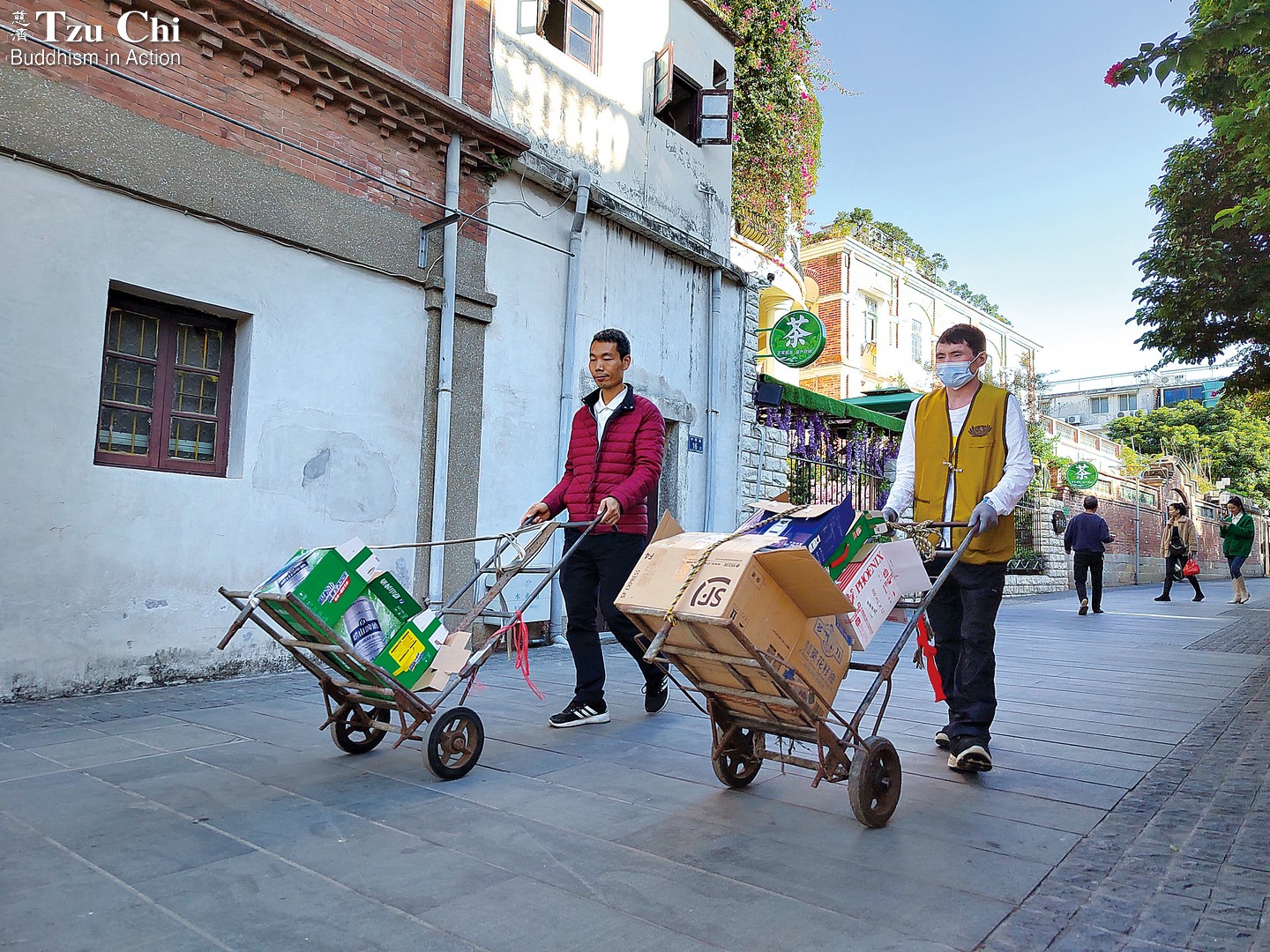
Luo (right) volunteers for Tzu Chi by collecting recyclables on Gulang Island during the one-week hiatus between his two treatment sessions.
Wang Huina
Sister Chunlian was in the habit of collecting recyclables such as bottles and cans; when she had accumulated a certain amount she’d ask her husband to deliver them to a Tzu Chi recycling station. Brother Luqiang was quite a neatnik, and averse to using his beloved car to transport the garbage, but he did it anyway. One day, when he got into his car, he found a cockroach in it. Turning to his wife, riding shotgun, he exclaimed, “My car has become a garbage truck!” Sister Chunlian replied, unperturbed, “It’s okay. I still like the car—and cockroaches as well.” Brother Luqiang could say nothing to that, and just started his car. As I saw it, he had been using his car to transport more than recyclable garbage—it also carried his kindness and mercy, and his love for Sister Chunlian.
During the week between my two treatment sessions, accompanied by Tzu Chi volunteers, I did recycling work, attended Tzu Chi study group sessions, took walks in the park, and made dumplings. I met a senior named Xue when I was sorting recyclables on Gulang Island, off the coast of Xiamen. Xue had lost his eyesight after a failed cataract surgery several years earlier. Devastated, he shut himself up at home; for more than a year he never once stepped out of his house. It was Tzu Chi volunteers’ repeated visits to him that helped him untangle his emotional knots and emerge from that difficult time. He was a changed man when I met him, actively engaged in Tzu Chi’s recycling work. Despite being sightless, he sorted recyclables with a great proficiency. A constant smile on his face revealed an inner sense of fulfillment and contentment.
I also met several elderly women, dissembling things with screwdrivers when I met them. When they got up from their seats, I noticed they all had some difficulty moving around. Despite their diminished mobility, they got out of their homes and took up volunteer work, contributing to a charitable cause.
On the morning I returned to the hospital to start my second treatment session, Brother Luqiang hoisted my heavy luggage onto his strong shoulder to carry it for me. That image is engraved in my mind.
Whenever I think back on those 37 days of treatment in Xiamen, memories of the time I spent with Tzu Chi volunteers come rushing back to me, creating waves of deep emotion in my heart. It is so hard to put those feelings into words. As Master Cheng Yen says, human nature is inherently good. But whenever I think of how Tzu Chi has been able to finance my treatment due to the contributions of countless ordinary people, tears well up in my eyes. Where would I be, if I hadn’t met Tzu Chi, if it weren’t for the love of so many people?
The first time I arrived home from the big city of Xiamen, I came back defeated, feeling sorry for myself that my plans for a successful life had come to nothing. But this time, thanks to Tzu Chi, I returned with a smile, with hope in my heart for better days ahead.
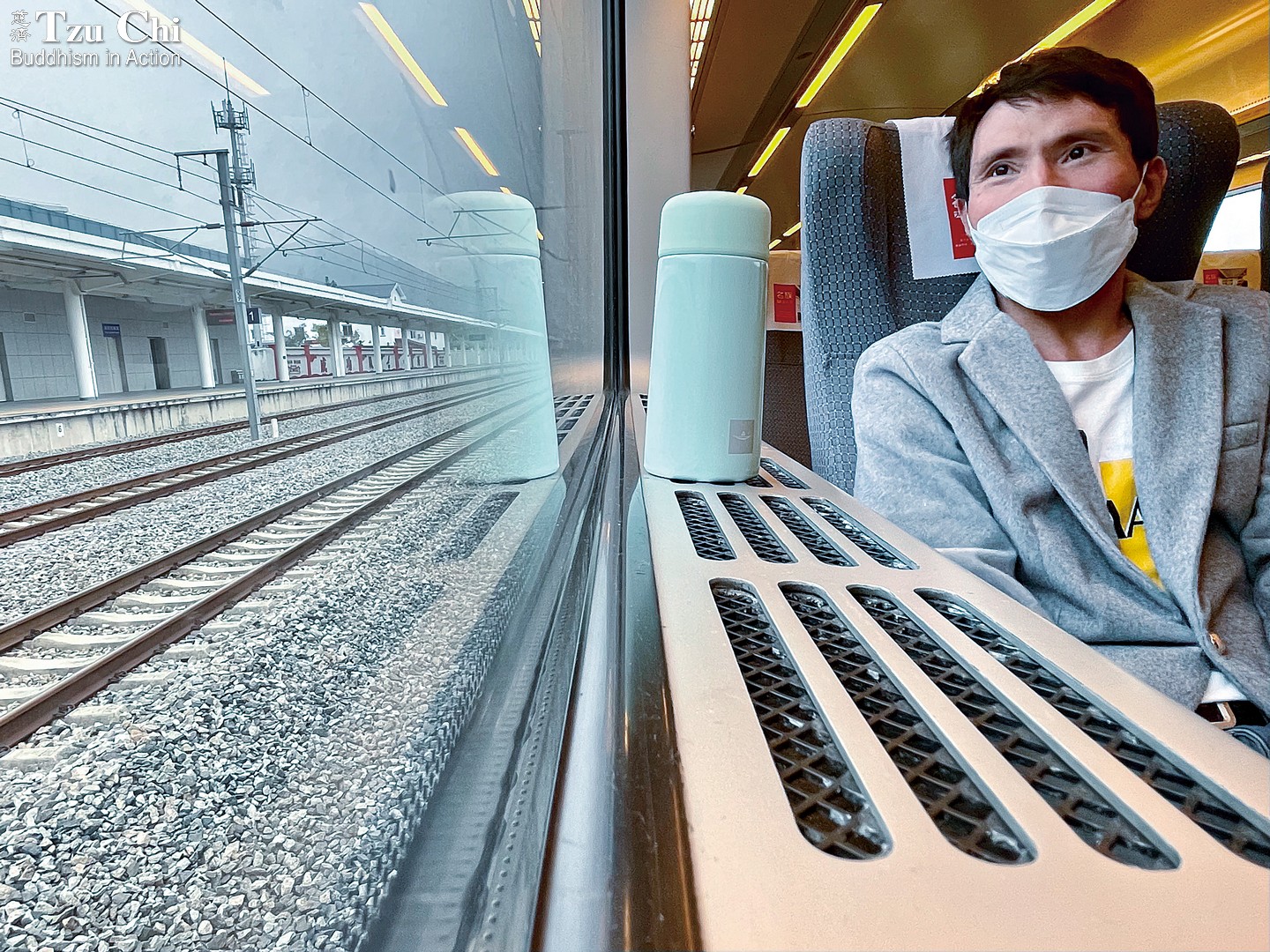
Luo on the train home on December 25, 2021, after a 37-day stay in Xiamen for treatment. Though his condition had greatly improved, he still needs to return to the Xiamen Hospital of Traditional Chinese Medicine every month for regular treatment.
Huang Dexin

